
A Practical Guide to Litigation Funding.
5th November 2024, 12:54 pm
Traditionally, clients pay solicitors on a privately paying basis. A fixed fee is agreed, or hourly rates are applied, and the client is billed for the work done by the solicitor.
Third party litigation funding is a form of non-recourse financing for litigation. Litigation funding can finance litigation, often through a third-party funder.
Enable is a bespoke funding arrangement between Weightmans, a funder, and an insurer, arranged via a broker, for commercial claims requiring litigation funding and adverse costs cover.
Providing a claim meets the pre-set criteria, funding can be obtained more efficiently, quickly and cost effectively.
In exchange for an agreed share of the proceeds of a successful claim, a third party litigation funder will normally fund some or all of the legal costs and disbursements to take the claim to trial. If the claim is unsuccessful the funder will lose its investment.
Litigation funding covers many types of cases, such as commercial contract disputes, shareholder disputes, property litigation, contentious trusts and probate, construction and engineering disputes, insolvency litigation, intellectual property, banking, debt recovery, subrogation and recoveries, partnership disputes, warranty claims and more.
Third party litigation can be very valuable to a business, to leverage meritorious claims as a potential asset and finance them off balance sheet with the use of third-party litigation funding. There are several other benefits of third-party litigation, such as fixed pricing, or increased certainty of securing ATE insurance (After the Event Insurance) and funding. It can also be a useful way to try and manage costs and maximise recoveries, which can be an effective way for businesses to pursue claims against well-resourced opponents.
In the event of a successful outcome the funder is paid a return on their investment, paid out of the damages or settlement sum received from the opponent. The premium on the ATE policy is also payable from the damages received, as well as any success fee payable to the solicitors and counsel.
Third party litigation funding is often combined with the law firm acting on some form of risk-reward basis in respect of its legal fees incurred in dealing with the litigation. Third party litigation funders often require the law firm to also have some investment in the case, with part of the legal fees at risk if the claim does not succeed.
There are several ways of funding the costs of litigation when the claim has prospects of success. One way would be through a law firm acting under a conditional fee or “no win-no fee” agreement (“CFA”). Where a claim has strong prospects of success, we can help you explore flexible funding arrangements. As well as companies, individuals can also benefit from commercial litigation funding by using this combined with ‘ATE’ insurance to alleviate some of the risk and cost of pursuing litigation where they may not otherwise have the necessary resources to fund a claim.
If you think you have a claim that may be suitable for third party litigation funding, we can discuss with you whether we consider that a funder may be interested in funding the claim. This will require consideration of the merits of the claim, the value of the potential claim, and whether the opponent is likely to have the means to meet any successful claim or is insured. If a claim is suitable for third party litigation funding, we will need to review the key documents and evidence and consider the likely costs to take the matter to trial
Cowgills Autumn Budget Report